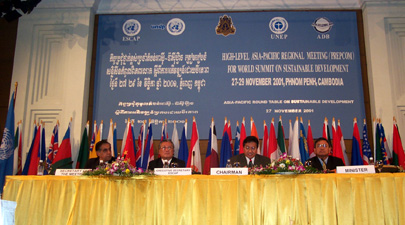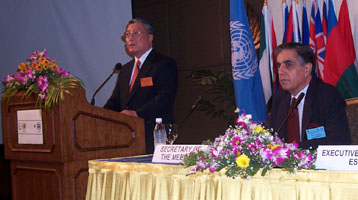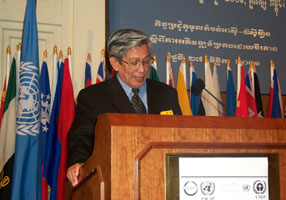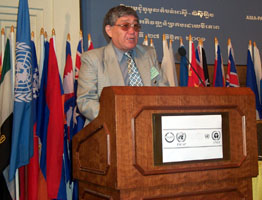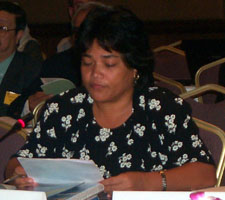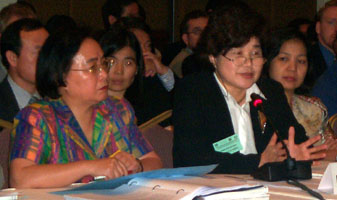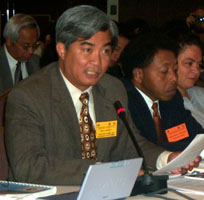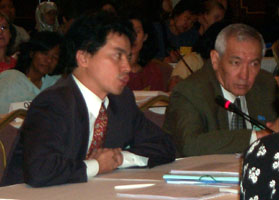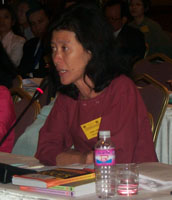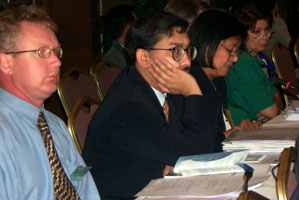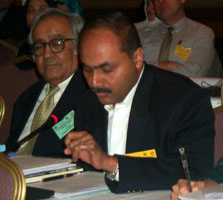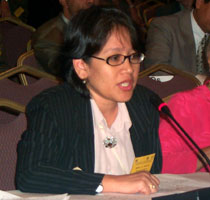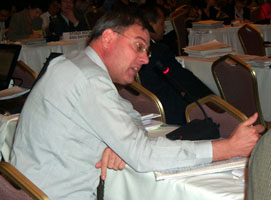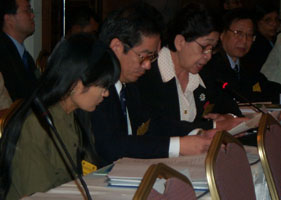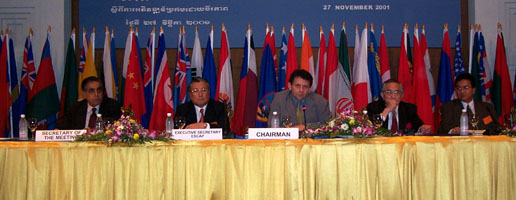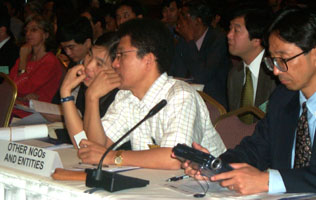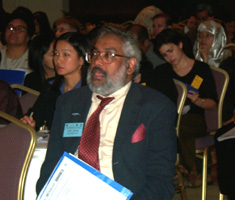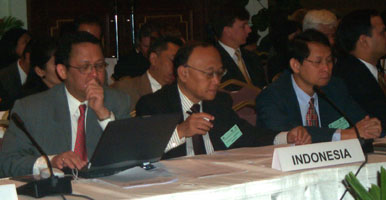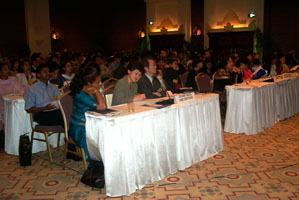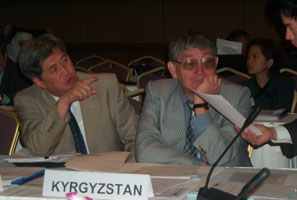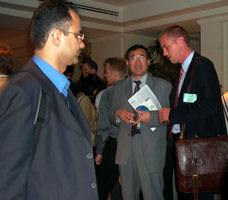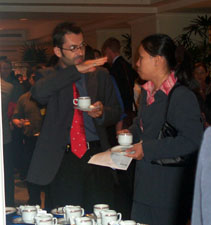 |
On
the first day of the Asia-Pacific Regional Meeting for the World Summit
on Sustainable
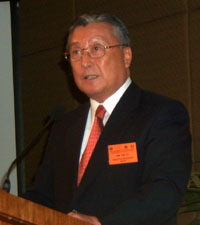 Development,
participants convened in a Roundtable on Sustainable Development
and engaged in informal consultations on the Draft Platform on
Sustainable Development. Delegates heard an opening address from Kim
Hak-Su, ESCAP Executive Secretary and an address by Mok Mareth, Cambodian
Minister of Environment. During the Roundtable, chaired by Cielito
Habito, Ateneo de Manila University (Philippines), the Draft Platform
was introduced by Ravi Sawhney (Environment and Natural Resources
Development Division, ESCAP), and reports were presented on the regional
Roundtables held in Kuala Lumpur, Malaysia (East Asia and the Pacific)
and in Bishkek, Kyrgyzstan (Central and South Asia). The East Asia
and Pacific Roundtable emphasized, inter alia: a sustainable development
philosophy based on local and regional values and lifestyles, which
have come under attack from commercialism and consumerism; the role
of finance, trade and economic development ministries; poverty as
an impediment to achieving progress in sustainable development; and
a multilateral approach to food security. The Central and South Asia
Roundtable emphasized: globalization; socioeconomic issues; reform
of international governance; financial resources and transfer of technology;
putting sustainable development into practice; consumerism; and peace
and security. Reports were also heard from the subregional intergovernmental
meetings, including those held in: Central Asia; South Asia; Southeast
Asia; Northeast Asia; and the Pacific. Reports from a subregional
stakeholders' meeting held in Central Asia and from business and industry
consultations were also presented. Development,
participants convened in a Roundtable on Sustainable Development
and engaged in informal consultations on the Draft Platform on
Sustainable Development. Delegates heard an opening address from Kim
Hak-Su, ESCAP Executive Secretary and an address by Mok Mareth, Cambodian
Minister of Environment. During the Roundtable, chaired by Cielito
Habito, Ateneo de Manila University (Philippines), the Draft Platform
was introduced by Ravi Sawhney (Environment and Natural Resources
Development Division, ESCAP), and reports were presented on the regional
Roundtables held in Kuala Lumpur, Malaysia (East Asia and the Pacific)
and in Bishkek, Kyrgyzstan (Central and South Asia). The East Asia
and Pacific Roundtable emphasized, inter alia: a sustainable development
philosophy based on local and regional values and lifestyles, which
have come under attack from commercialism and consumerism; the role
of finance, trade and economic development ministries; poverty as
an impediment to achieving progress in sustainable development; and
a multilateral approach to food security. The Central and South Asia
Roundtable emphasized: globalization; socioeconomic issues; reform
of international governance; financial resources and transfer of technology;
putting sustainable development into practice; consumerism; and peace
and security. Reports were also heard from the subregional intergovernmental
meetings, including those held in: Central Asia; South Asia; Southeast
Asia; Northeast Asia; and the Pacific. Reports from a subregional
stakeholders' meeting held in Central Asia and from business and industry
consultations were also presented. 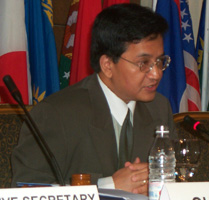 A
Special Session on Financing Sustainable Development, chaired by Kalman
Mizsei (UNDP) was convened in the afternoon, and included the following
panelists: Jagdish Pokharel (Member, Planning Commission, Government
of Nepal); Cielito Habito; and Lin See Yan (CEO, Lin Associates, Malaysia).
Ensuing discussions addressed issues such as: an international framework
on investment; domestic resource mobilization; extensive funding of
unsustainable projects and corruption; and return of international
aid to donors via payments to foreign technical advisors. Informal
consultations on the Draft Platform on Sustainable Development took
place in the late afternoon and into the night, with delegates only
taking a short break from negotiations to attend an ESCAP-hosted reception.
Even given the pressure to complete negotiation of the Platform by
the start of the following day's Ministerial Segment, progress was
slow, with the group only reaching paragraph 8 of 42 by 10:45 PM -
and at the time of posting - no sign of adjourning. General comments
revealed concerns regarding, inter alia, decreasing ODA, the unwelcome
entry of the WTO into the environment policy arena, and the need for
proper mechanisms for technology transfer. Specific and contentious
issues revolved around the headings of various sections and references
to "good governance," inadequate financial resources as a major constraint
to sustainable development implementation, and ethnic and interstate
conflicts. Photo: Kim Hak-Su, ESCAP Executive
Secretary (right) and Roundtable Chair Cielito Habito A
Special Session on Financing Sustainable Development, chaired by Kalman
Mizsei (UNDP) was convened in the afternoon, and included the following
panelists: Jagdish Pokharel (Member, Planning Commission, Government
of Nepal); Cielito Habito; and Lin See Yan (CEO, Lin Associates, Malaysia).
Ensuing discussions addressed issues such as: an international framework
on investment; domestic resource mobilization; extensive funding of
unsustainable projects and corruption; and return of international
aid to donors via payments to foreign technical advisors. Informal
consultations on the Draft Platform on Sustainable Development took
place in the late afternoon and into the night, with delegates only
taking a short break from negotiations to attend an ESCAP-hosted reception.
Even given the pressure to complete negotiation of the Platform by
the start of the following day's Ministerial Segment, progress was
slow, with the group only reaching paragraph 8 of 42 by 10:45 PM -
and at the time of posting - no sign of adjourning. General comments
revealed concerns regarding, inter alia, decreasing ODA, the unwelcome
entry of the WTO into the environment policy arena, and the need for
proper mechanisms for technology transfer. Specific and contentious
issues revolved around the headings of various sections and references
to "good governance," inadequate financial resources as a major constraint
to sustainable development implementation, and ethnic and interstate
conflicts. Photo: Kim Hak-Su, ESCAP Executive
Secretary (right) and Roundtable Chair Cielito Habito |
 Kim
Hak-Su, Executive Secretary of ESCAP,
emphasized the region's interest in an open, participatory and transparent
UNCED review process, noting efforts made towards this end in the
regional preparatory process. He said the Roundtable was convened
to consolidate the assessment of the achievements, identify major
constraints and new initiatives, and make new commitments toward
overcoming the constraints and fostering progress.
Kim
Hak-Su, Executive Secretary of ESCAP,
emphasized the region's interest in an open, participatory and transparent
UNCED review process, noting efforts made towards this end in the
regional preparatory process. He said the Roundtable was convened
to consolidate the assessment of the achievements, identify major
constraints and new initiatives, and make new commitments toward
overcoming the constraints and fostering progress. |
|
 Dr.
Mok Mareth, Cambodian Environment Minister, welcomed participants,
noting that the region is the most diverse in terms of geography,
politics, economics, culture, language and religion. Mareth highlighted
water, coastal and transboundary issues and called for: adaptive
approaches to address sustainable development at the national level;
poverty reduction through multi-sectoral, gender-integrated economic
growth; efforts to link environmental concerns with economic growth;
development of mechanisms to solve sustainable development challenges;
and collaboration of developed and developing countries for technology
development and skills transfer for sustainable development.
Dr.
Mok Mareth, Cambodian Environment Minister, welcomed participants,
noting that the region is the most diverse in terms of geography,
politics, economics, culture, language and religion. Mareth highlighted
water, coastal and transboundary issues and called for: adaptive
approaches to address sustainable development at the national level;
poverty reduction through multi-sectoral, gender-integrated economic
growth; efforts to link environmental concerns with economic growth;
development of mechanisms to solve sustainable development challenges;
and collaboration of developed and developing countries for technology
development and skills transfer for sustainable development. |
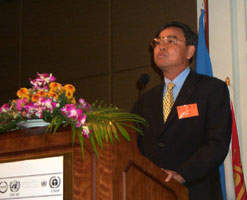 |
|
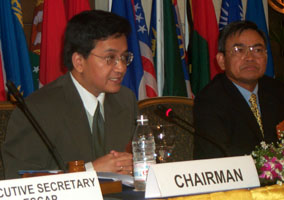 Roundtable
Chair Cielito Habito made a few observations based on his involvement
in WSSD-related meetings and stressed the need to: consider sustainable
development holistically, comprehensively and in an integrated manner
at the sectoral, planning, governance and implementation levels;
focus on the "how to" elements of achieving sustainable development;
and find concrete ways to operationalize partnerships between government,
civil society and the private sector. Roundtable
Chair Cielito Habito made a few observations based on his involvement
in WSSD-related meetings and stressed the need to: consider sustainable
development holistically, comprehensively and in an integrated manner
at the sectoral, planning, governance and implementation levels;
focus on the "how to" elements of achieving sustainable development;
and find concrete ways to operationalize partnerships between government,
civil society and the private sector.
 During
the closing session, Chair Habito summarized key points raised during
the Roundtable, stating that progress has been made in regards
to Agenda 21, but it has been far from satisfactory. Many speakers
noted that the Asia-Pacific is the most diverse region in the world,
and priorities for action need to take this into account. Participants
identified subregional priority issues including, inter alia, poverty,
globalization, capacity building, governance, financing for sustainable
development, environmental security and safety; external debt burden,
biotechnology, gender equity consideration, investment, the WTO,
and unsustainable consumption.
During
the closing session, Chair Habito summarized key points raised during
the Roundtable, stating that progress has been made in regards
to Agenda 21, but it has been far from satisfactory. Many speakers
noted that the Asia-Pacific is the most diverse region in the world,
and priorities for action need to take this into account. Participants
identified subregional priority issues including, inter alia, poverty,
globalization, capacity building, governance, financing for sustainable
development, environmental security and safety; external debt burden,
biotechnology, gender equity consideration, investment, the WTO,
and unsustainable consumption.
|
Regional Platform on Sustainable Development for Asia and
the Pacific
Introduction
by ESCAP, brief reports by the chairpersons of the two regional roundtables
for East Asia and the Pacific and Central and South Asia |
 Ravi
Sawhney, Environment and Natural Resources Development Division,
ESCAP,
expressed his hope that the meeting will communicate to the global
process the central role that the Asia-Pacific region plays in
sustainable development, and outlined the history of the process,
highlighting challenges associated with the region's diversity.
He stated that the Draft Platform addresses the "why and how"
of implementation mechanisms, such as financing, one of the major
constraints to Agenda 21 implementation. Describing the six initiatives
in the Draft Platform, he noted that the first one addresses capacity
building, and that each of the other five relate to the subregions.
Ravi
Sawhney, Environment and Natural Resources Development Division,
ESCAP,
expressed his hope that the meeting will communicate to the global
process the central role that the Asia-Pacific region plays in
sustainable development, and outlined the history of the process,
highlighting challenges associated with the region's diversity.
He stated that the Draft Platform addresses the "why and how"
of implementation mechanisms, such as financing, one of the major
constraints to Agenda 21 implementation. Describing the six initiatives
in the Draft Platform, he noted that the first one addresses capacity
building, and that each of the other five relate to the subregions.
|
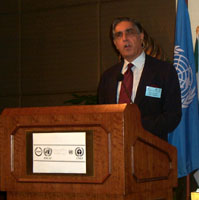 |
|
|
 Reporting
on the Roundtable addressing Central and South Asia, Nordin H.J. Hasan,
Malaysia, observed that civil society is emerging as an important
factor in promoting sustainable development, challenging development
paradigms and initiating partnerships with governments at different
levels. He said the Roundtable emphasized, inter alia: a sustainable
development philosophy based on local and regional values and lifestyles,
which have come under attack from commercialism and consumerism; the
role of finance, trade and economic development ministries; poverty
as an impediment to achieving progress in sustainable development;
and a multilateral approach to food security.
Reporting
on the Roundtable addressing Central and South Asia, Nordin H.J. Hasan,
Malaysia, observed that civil society is emerging as an important
factor in promoting sustainable development, challenging development
paradigms and initiating partnerships with governments at different
levels. He said the Roundtable emphasized, inter alia: a sustainable
development philosophy based on local and regional values and lifestyles,
which have come under attack from commercialism and consumerism; the
role of finance, trade and economic development ministries; poverty
as an impediment to achieving progress in sustainable development;
and a multilateral approach to food security. |
|
|
 Noting that the region
comprises approximately half of the world's population, Chair
of the Central and South Asia Roundtable, Asylbek Aidaraliev (Kyrgyzstan),
highlighted the issues discussed by the Roundtable such as globalization,
socioeconomic issues, reform of international governance, international
instruments, financial resources and transfer of technology, putting
sustainable development into practice, consumerism, peace and security.
The priority issues identified were the debt, mountain and desert
issues.
Noting that the region
comprises approximately half of the world's population, Chair
of the Central and South Asia Roundtable, Asylbek Aidaraliev (Kyrgyzstan),
highlighted the issues discussed by the Roundtable such as globalization,
socioeconomic issues, reform of international governance, international
instruments, financial resources and transfer of technology, putting
sustainable development into practice, consumerism, peace and security.
The priority issues identified were the debt, mountain and desert
issues. |
|
Karibaiti
Taoaba, Kirabati, for the South Pacific, noted the key areas
identified for the South Pacific region such as ocean management,
climate change, island vulnerability, energy, health and governance
issues, capacity building, and financial resources for sustainable
development.
|
|
|
|
 For
Northeast Asia, Park Eun-kyung
highlighted the main issues identified at the subregional meeting,
such as participation by major groups, education, desertification
and lands degradation and biodiversity loss.
For
Northeast Asia, Park Eun-kyung
highlighted the main issues identified at the subregional meeting,
such as participation by major groups, education, desertification
and lands degradation and biodiversity loss.
|
|
The
Third World Network elaborated on two key sustainable development
issues: globalization and militarism, specifically the resource
drain of the military-industrial complex and a few large transnational
corporations, and noted that if this region is proud to be a model
of diversity, then it cannot expect to have only one model of sustainable
development.
|
|
|
The
Asia-Pacific Forum of Environmental Journalists noted the
role that journalists can take to raise environmental awareness
and internalize environmental conservation, and supported creation
of a regional information center.
|
|
|
|
The Indonesian
Forum for Environment stressed the need for more regional cooperation
on issues such as the timber trade and depletion of fish stocks in
the South Pacific, and the need to address extensive high-level corruption,
which as hindered the implementation of sustainable development. |
 Victoria
Tauli-Corpuz, Tebtebba Foundation, on behalf of the Asia-Pacific
Peoples' Forum, pointed out critical sustainable development
issues absent from the Draft Platform on Sustainable Development,
such as, inter alia, environmental and social security, biopiracy,
misappropriation of resources by corporations and alternative development
approaches. She expressed concern with text promoting globalization,
privatization of essential services, and the use of market mechanisms
to achieve sustainable development
Victoria
Tauli-Corpuz, Tebtebba Foundation, on behalf of the Asia-Pacific
Peoples' Forum, pointed out critical sustainable development
issues absent from the Draft Platform on Sustainable Development,
such as, inter alia, environmental and social security, biopiracy,
misappropriation of resources by corporations and alternative development
approaches. She expressed concern with text promoting globalization,
privatization of essential services, and the use of market mechanisms
to achieve sustainable development |
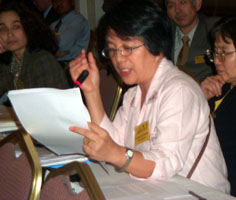 |
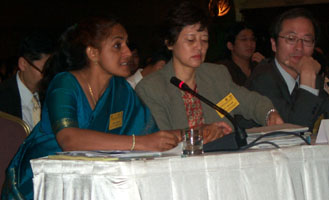
|
Kamal
Melvani, Neo-Synthesis Research Center (left) highlighted
ecological restoration as a key issue, and shared examples of
experiences and technology that have been used in Sri Lanka to
address environmental destruction.
|
|
Daphne
Roxas, the Asian Women's Network, presented the declaration
from the Asian Women's Conference on Gender, Finance and Sustainable
Development highlighting, inter alia, increasing poverty
and diminishing human security, and called on the reaffirmation
of commitment to gender equality and women's rights.
|
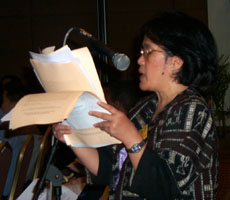 |
|
|
Philippe
Bergeron, Director, the Regional Institute for Environmental Technology,
noted several meetings had been held by the business community,
stated that sustainable development will never be achieved without
investment and proposed that: investment is added in the main text
as aspect of economic transformation; and the addition of the finance
and academia as stakeholder groups. |
|
|
Malee
Suwana-Adth, APPROTECH Asia observed that the Draft Platform initiative
regarding biodiversity and natural resource conservation focuses on
ex situ or "virtual" conservation, and called for text ensuring future
access to genetic resources. |
| Special Session on financing sustainable development |
|
Ravi
Sawhney, ESCAP, Kim Hak-Su, ESCAP Executive Secretary, Kalman Mizsei,
UNDP, Lin See Yan, Lin Associates, and Cielito Habito, Special Advisor
to the Earth Council
|
|
|
Kalman
Mizsei, UNDP, chaired and opened this afternoon session, expressing
thanks to Cambodia for hosting the meeting and for including this
topic and opportunity for discussion. He noted success at the country
level in terms of capacity building and regulations, but the need
to link supply and demand sides and to work on law enforcement.
|
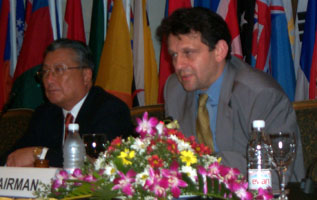 |
|
Jagdish
Pokharel, Planning Commission, Government of Nepal, noted some
of the positive results in financing for sustainable development
such as: tax reforms; environmental taxes; reduced subsidies; and
privatization of inefficient sectors. He provided examples from
Nepal, including grassroots initiatives.
|
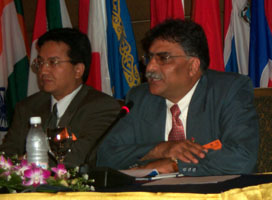 |

 Linkage's
Portal to the Johannesburg Summit 2002 Linkage's
Portal to the Johannesburg Summit 2002
 ENB
Coverage of the First Preparatory Session of the World Summit on Sustainable
Development ENB
Coverage of the First Preparatory Session of the World Summit on Sustainable
Development
 ENB
Coverage of the UNECE Regional Ministerial Meeting for the World Summit
on Sustainable Development ENB
Coverage of the UNECE Regional Ministerial Meeting for the World Summit
on Sustainable Development
 ENB
Coverage of the African Regional Preparatory Meeting for the World Summit
on Sustainable Development ENB
Coverage of the African Regional Preparatory Meeting for the World Summit
on Sustainable Development
 ENB
Coverage of the West Asia Regional Preparatory Meeting for the World Summit
on Sustainable Development ENB
Coverage of the West Asia Regional Preparatory Meeting for the World Summit
on Sustainable Development
 ENB
Coverage of the Latin America and Caribbean Regional Preparatory Meeting
for the World Summit on Sustainable Development ENB
Coverage of the Latin America and Caribbean Regional Preparatory Meeting
for the World Summit on Sustainable Development
 UN
Economic and Social Commission for Asia and the Pacific UN
Economic and Social Commission for Asia and the Pacific
 Asia
Pacific Regional Preparatory Process Asia
Pacific Regional Preparatory Process
 Stakeholder
Segment at the Asia-Pacific Regional PrepCom Stakeholder
Segment at the Asia-Pacific Regional PrepCom
 South
Africa Summit Site South
Africa Summit Site
 UN
Official Summit Website UN
Official Summit Website
|


